Start - Aktualności - Microworld Week is behind us
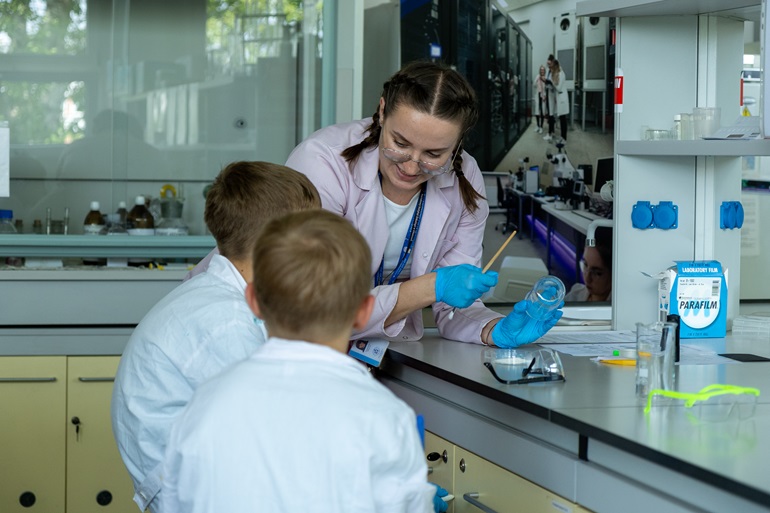
Microworld Week is behind us
What lives inside plants, whether the kitchen can be a small laboratory, what lives in our intestines, what is inside a cancer cell and how to professionally collect traces at a crime scene - all this and more could be learned by the participants of the workshops and lectures prepared during the Microworld Week. The event, organized by the Silesian University of Technology in cooperation with the Faculty of Natural Sciences of the University of Silesia, took place as part of the celebration of the European City of Science Katowice 2024.
The Microworld Week took place from July 15th to 19th, 2024. The event covered issues related to the way animate and inanimate microworlds are created. Participants could get to know them and look at them, thanks to the use of microscopic techniques.
The Microworld Week was inaugurated with a lecture entitled “The plant world is becoming more and more micro,” delivered by Prof. Dorota Kwiatkowska from the Faculty of Natural Sciences of the University of Silesia.
– One of the duties of university employees, in addition to research and classes with students, is to popularize knowledge. It is very important that we do not close ourselves off and share our knowledge outside the university and show what scientists do. This is important in times when many phenomena may be incomprehensible. We want everyone, not only scientists, to be aware of the world around us and be able to understand it, said Prof. Kwiatkowska.

During the Microworld Week, there were many lectures and workshops during which participants could take a closer look at microorganisms, use chemical reagents to identify various substances, and learn about science in practice.
– The aim of this week is, first of all, to make each of us realize that, firstly, learning is not that scary, and secondly, it is very useful in our lives. What we use in practice today is also science, because these things were once invented, developed, described and now we can use them. During the Microworld Week, we want to present microorganisms first of all, because they, especially bacteria, can be associated negatively, e.g. with diseases. However, we show that microorganisms have great potential, e.g. in environmental protection. Based on them, we can develop various types of preparations that will support the development of plants, which is very important in the perspective of the changing climate, said Dr Justyna Michalska from the Faculty of Energy and Environmental Engineering at the Silesian University of Technology.
The workshops were aimed at both adults and children. The kids liked the laboratories and all the devices where scientists work the most. - We are very happy that we can participate in such activities. We were at the lecture; we will also be at the workshops. My children are interested in science, so this is an interesting experience for them. I am convinced that this will contribute to increasing their interest in science - said Mr. Adam Terlikowski, father of Hania and Frank, who visited the laboratories.

On the first day, the youngest, but also the slightly older ones, also listened to a lecture combined with shows entitled: Nature as a constructor - biomimetic solutions from the micro to macro scale, led by Marek Ples, a PhD student at the Faculty of Biomedical Engineering. - I talked about biomimetics, i.e. a field that tries to imitate natural solutions in technology or science, i.e. how to adapt nature's solutions to our benefit. I prepared a set of simple experiments for the participants, mainly in the field of smart materials. Participants could prepare substances that change colour when heated or a liquid that changes colour when shaken. I always try to prepare my classes so that everyone can get something interesting from them, said the scientist.
- I think that organizing events such as Microworld Week is very important. There is a common belief that science is something secret and not everyone has access to it. By organizing such interesting events, we can present our work - summarizes Marek Ples.

On the second day of the Microworld Week, participants could play the role of forensic laboratory workers, find out whether the kitchen can be a scientific laboratory, and take a closer look at the cells of various useful microorganisms.
Classes were held in Gliwice, Katowice and Chorzów. The "Colourful secrets of cells" workshop was held at the Faculty of Exact Sciences and Technology of the University of Silesia in Chorzów. Participants could see what was inside cancer cells.
- During these classes, participants could learn how a cancer cell is constructed and also see and perform so-called cancer cell cultures themselves. Then they examined them using fluorescent dyes, and the prepared preparations could be viewed under a fluorescent microscope, says Dr Justyna Michalska from the Faculty of Energy and Environmental Engineering at the Silesian University of Technology.
The "Microworld in our kitchen" workshop was held in the Department of Environmental Biotechnology in Gliwice. Participants learned that the kitchen is actually a small laboratory where various chemical reactions and physical phenomena occur every day. It was possible to find out why some substances do not mix, while others, when combined, can cause an explosion or create foam of gigantic proportions.
The Biotechnology Centre of the Silesian University of Technology invited crime fiction lovers to workshops titled "CSI: Gliwice". During the workshops, participants could take on the role of real crime laboratory employees whose task was to solve the mystery of "who is the criminal?" Workshop participants learned how to professionally collect and analyse traces, such as fingerprints or hair.
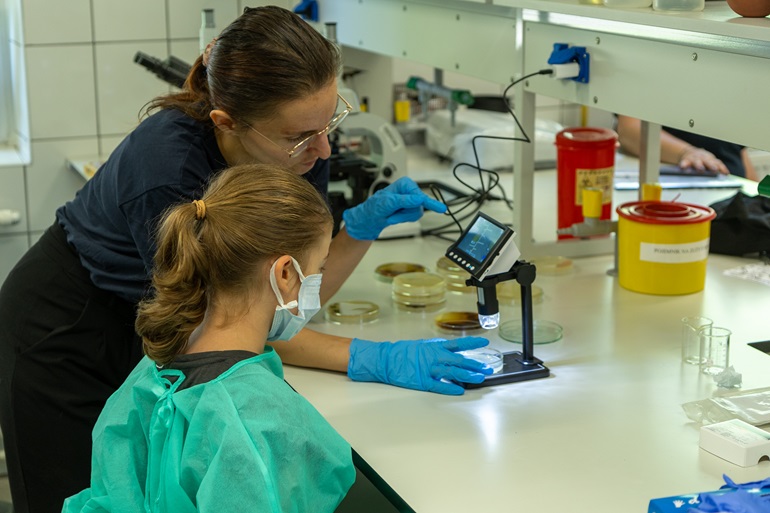
On Wednesday, classes were held under the slogan "Wanted! Beneficial bacteria and their important features", "Microworld in my body and around me - should we be afraid of all microorganisms" and "Intestinal microcivilization", led by Paulina Sowik, a PhD student at the Department of Environmental Biotechnology at the Silesian University of Technology.
- During the workshops, you could learn what microorganisms live in our digestive tract, especially in the intestines. Which of them naturally inhabit our intestinal microbiome, how important it is to take care of it. I also tried to debunk several myths and simplifications in this field, such as the fact that the intestines are our second brain - notes the doctoral student.
After the theoretical part, it was time for research. - The participants could learn how to perform cultures and become familiar with the basics of staining bacteria and other microorganisms, so the classes were similar to those of our students - added the scientist.
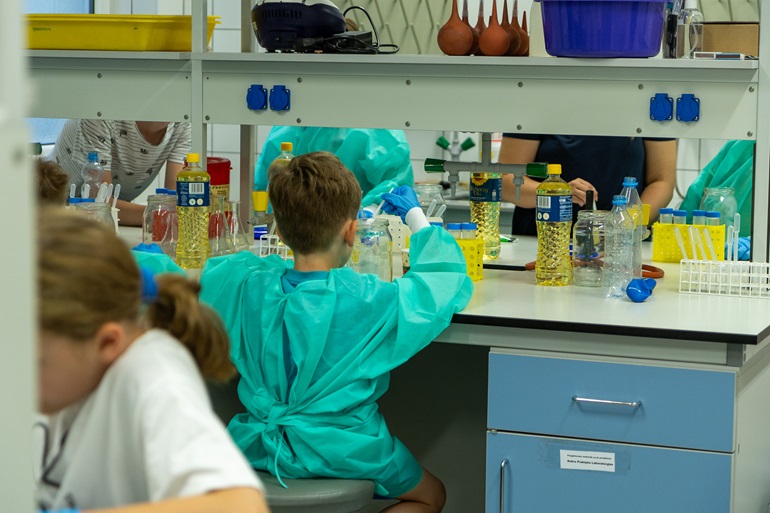
The knowledge provided during such workshops will certainly be useful in everyday life. - Not everyone knows that there are more microorganisms in our body than people in the world. Workshop participants learned which of them can be useful for us and which can be harmful to us - said Dr Eng. Anna Byczek – Wyrostek from the Biotechnology Centre at the Silesian University of Technology.
Secondary school graduates Dominika Curyło and Paulina Lipińska took part in the workshops.
- We've had a lot of fun here. I believe that there should be such classes already in the secondary school, says Dominika. – I learned a lot of interesting things, presented in a much more interesting way than the lecture itself. Thanks to such classes, you can learn about exact sciences, adds Paulina.

On Thursday, participants of the Microworld Week learned about what lives inside plants, learned about the "cool adventures of flying bacteria" and took part in the "Microworld of macro-possibilities" workshop.
- This lecture and workshops were addressed to children. We wanted to talk to them about what microorganisms are, whether they are good or bad. We also talked about viruses and their use as an alternative to antibiotics. The children took an active part in the classes and looked at microorganisms under a microscope - explains Dr Justyna Michalska from the Department of Biotechnology.
- I believe that you can gain a lot of information from such classes, because learning through practice is more interesting. Most people prefer to learn through practice, the scientist concluded.
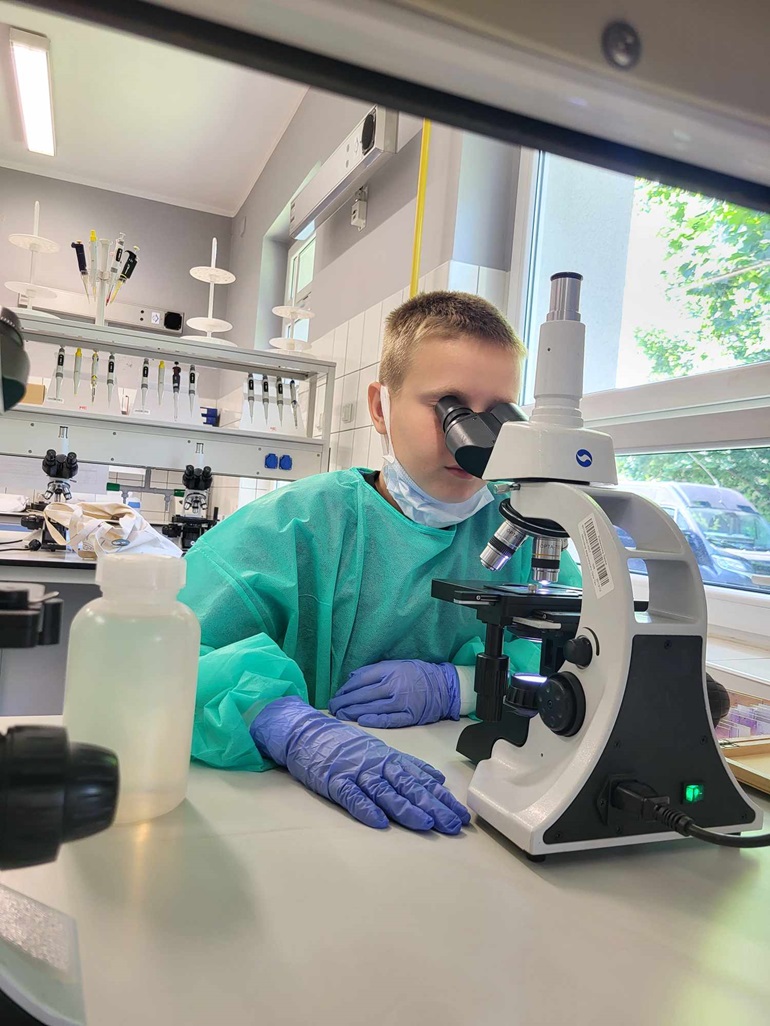
During the Microworld Week, Saturday morning at the Silesian University of Technology looked unusual. In the gardens next to the Polymer Building, there was breakfast on the grass and a unique outdoor lesson, during which the youngest and their parents could listen to interesting stories about microorganisms, but also take a closer look at what is squeaking in the grass.
You could also learn about the microworld during lectures and workshops on micro fungi.
- The workshops, during which participants could observe previously unknown organisms, attracted the greatest interest - admitted Dr Justyna Michalska, one of the event coordinators.
The events took place both on the campus of the Silesian University of Technology in Gliwice and in the Kato Science Corner in Katowice. Regardless of age, the topic of the microworld attracted participants.
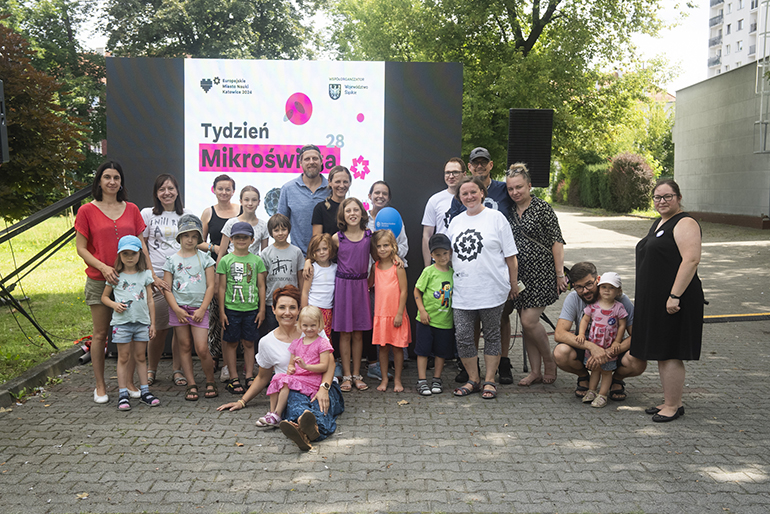
Grzegorz Lankosz, who deals with microfilm, which could be seen on Saturday evening, did not hide the fact that it is a world we have no idea about, but it can influence our everyday lives.
- I became interested in this completely by accident. Today, while searching for various microorganisms and samples near my home, I make extraordinary discoveries - admitted the author of the film "Microscopic Hollywood - the role of 'micro' organisms in human life."
During the film, you could learn about organisms that are usually invisible to the eye and can revolutionize the world.
- For me, the discovery is the hydra, i.e. an organism that regenerates itself and is reborn, it can serve as an example in the study of longevity - added the author of the film.
The micro-scale photo show was also insightful. The presentation was prepared by a world-famous expert in this field - Marek Miś.

Viewers could see that soy sauce, corn ointment and air bubbles, observed with a microscopic eye, take on completely different colours and character. When you add the right light and polarization, they create real works of art.
- Anyone can start their adventure with microphotography. You certainly need patience and appropriate equipment - a good microscope and a camera that will work well with this microscope - explained the author.
The Microworld Week took place from July 15th to 19th, 2024.
The curators of the event were: Dr Hab. Eng. Anna Gnida and Dr Justyna Michalska from the Faculty of Energy and Environmental Engineering, and the producer was Dr Eng. Anna Byczek-Wyrostek.










